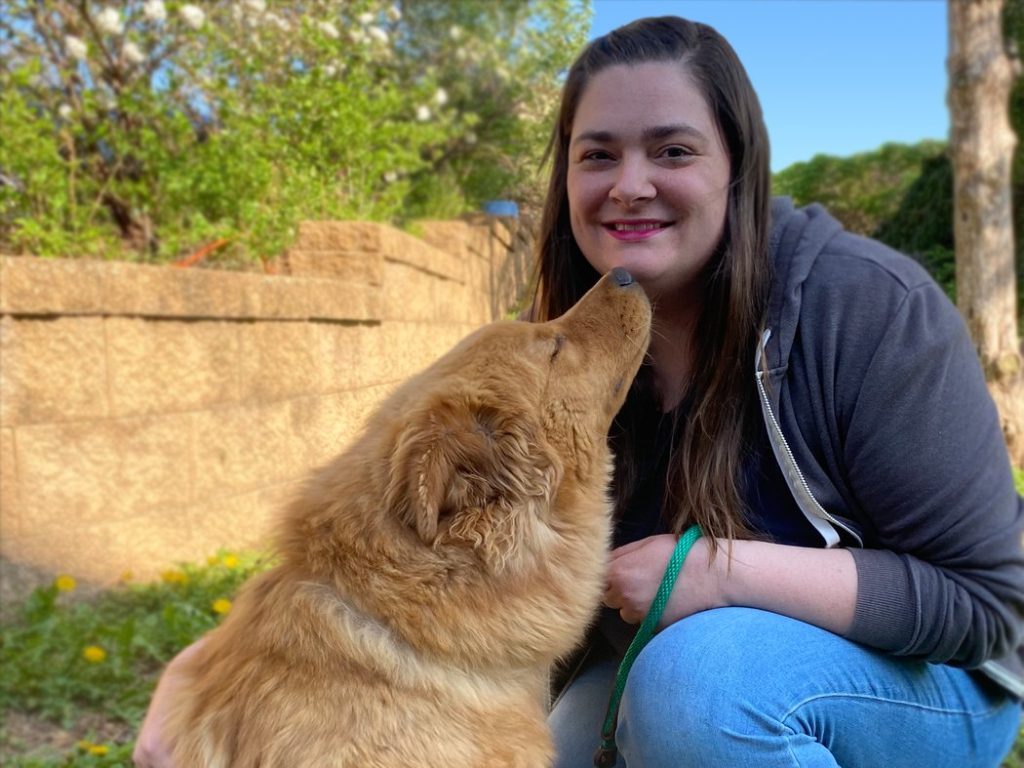
Animal expert, Ashley Flores, CPDT-KA, is the Senior Director of Animal Behavior and Training at Great Plains SPCA. Ashley studied under the Council of Certified Professional Pet Dog Trainers (CCPDT), is CPDT-KA certified and American Kennel Club Canine Good Citizen (CGC) certified for nine years. She also earned certification for Behavior Pharmacology and Separation Anxiety through Heartland Positive Dog Training Alliance (HPDTA) Training. Email askashley@greatplainsspca.org for a chance to have your pet question answered in KC Parent magazine.
We have an eight-year-old rescue pup that became accustomed to being with his humans all the time due to remote working. (Three years now!) The last family member is transitioning back to work so we reintroduced the crate slowly. Burt did fine until he was left for more than two hours. He tried to chew his way out of the steel crate and injured his lips and gums. How do we help him adjust to his people being gone? We cannot afford doggie daycare and he is destructive if we leave him to roam the house when no one is home. Our vet suggested anxiety medication, but we tried it once and when we came home, he was lethargic and out of it. We just want our sweet boy to be safe and happy. – Kristen Bray
I recommend chatting with your vet about a lower dose of antianxiety medication. These medications are great to help a dog adjust to a routine. You can slowly wean Burt off the medication as he becomes accustomed to being alone. Antianxiety medications are great, but all animals react differently so it’s crucial that you find the one that works for your pet. Dogs are associative learners, which means they learn in patterns, so give him a routine. Start creating a pattern of offering your pet a high value toy or type of food right before you leave. Make sure this item is something he only gets when you are away from the home, so that it stays a highly valued item. Do not get excited when you return home or at least don’t show excitement to your pet. Make leaving and returning to the home no big deal at all to your pet. Once the dog is calm after your arrival, reward him by giving love and pets. This is difficult for many people since we love to greet our pets when we get home. Never scold or punish your pet when they’re displaying separation anxiety because that will cause confusion and mistrust with your pet and in most cases, make the situation much worse. I recommend doing kennel time for a couple of hours every day even when people are home so that he can get used to the routine of being in a kennel. – Ashley Flores, CPDT-KA
I have a dog that won’t settle down in the kennel. He has eaten his bed, destroyed the floor mat and hardly responds at all to food in his kennel. If we put anything other than his Kong in the kennel, he destroys it. We have tried feeding him in his kennel, making him go in for quick bursts, and increasing time spent in the kennel when working from home. He can chill in his kennel for up to an hour when I work from home, sometimes even with the office door closed. We are running out of ideas on how to calm him. Are there classes that you would recommend or other training techniques you use? – Ally Howard
Please read the previous question and response since it pertains to crate training as well. Crating can be effective for some animals with separation anxiety but can also be detrimental for others with confinement anxiety or severe separation anxiety. Try to make the crate a fun and positive place. This is not a place to put your dog when they’re in trouble. Teach your pet to love the crate by taking it slow and rewarding them when they do a good job in their kennel. If your pet is excessively panting or is at risk of hurting themselves, this is not the best option. Try to play out-of-sight games. An example would be teaching your dog to stay while you move further and further away and eventually into another room. Encourage your pet to be in a different room while they eat and play or play outside without your presence to teach them that being separated is okay. If your pet has severe separation anxiety, you may need to consult a behavior pharmacologist or veterinarian to discuss the possibility of medication to help with severe anxiety. The medications can also be used short-term while you are establishing a routine. We offer behavior consultations at Great Plains SPCA if you would like to learn more.– Ashley Flores, CPDT-KA
Email askashley@greatplainsspca.org for a chance to have your pet question answered in KC Parent magazine. We also have new Behavior and Training classes starting soon! Great Plains SPCA alumni receive $50 off of new class sign up. CLICK HERE to sign up today!

